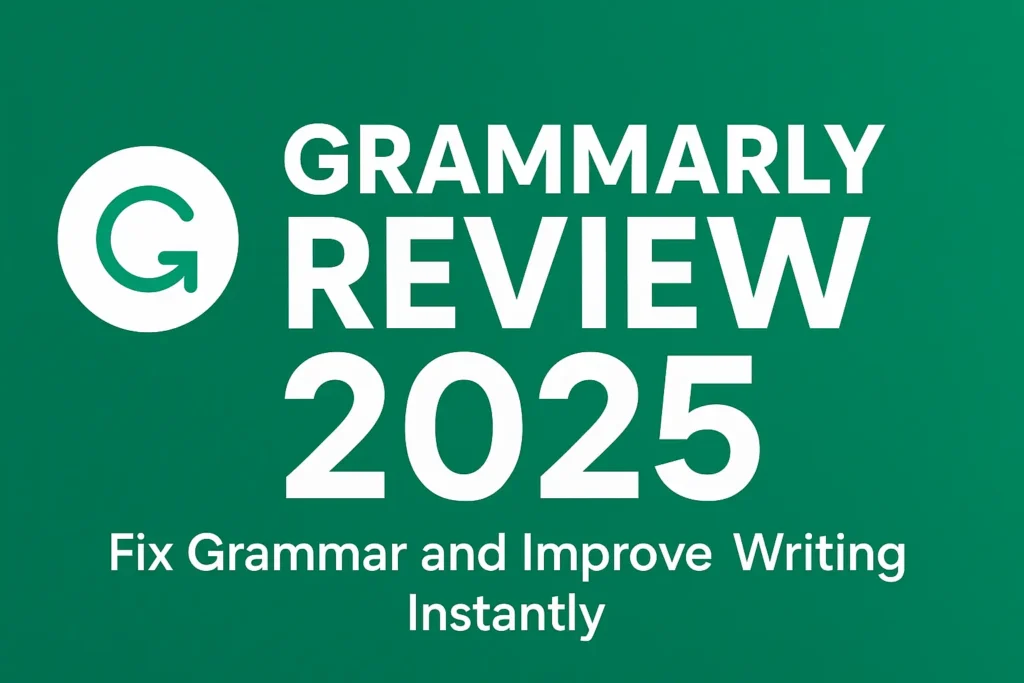Writing is one of the most powerful ways to communicate online, whether you are a student, blogger, freelancer, or professional etc. But even the best writers make mistakes. Spelling errors, grammar slips, and unclear sentences can make your writing look unprofessional. That’s where Grammarly comes in.

Grammarly is a free and powerful online writing assistant that helps you write clear, mistake-free, and effective English. In this post, we’ll explore what Grammarly is, its key features, how it works, its benefits, and whether it’s worth using in 2025.
What is Grammarly?
Grammarly is an AI-powered writing tool that checks your text for grammar mistakes, spelling errors, punctuation, clarity, and style issues. It was launched in 2009 and has since become one of the most popular writing assistants worldwide.
Whether you are writing an email, a school essay, a blog post, or a professional report, Grammarly ensures that your writing is polished and error-free.
How Does Grammarly Work?
Grammarly uses Artificial Intelligence (AI) and Natural Language Processing (NLP) to analyze your writing. It works in real time and suggests corrections while you type.
You can use Grammarly in different ways:
Grammarly Browser Extension (Chrome, Edge, Firefox, Safari)
Grammarly Desktop App (Windows & Mac)
Grammarly Web Editor (login and paste text directly)
Grammarly Keyboard (for Android & iOS)
Microsoft Word & Outlook Add-in
With these options, Grammarly is available almost everywhere you write.
Key Features of Grammarly
Here are the top features that make Grammarly the best grammar checker in 2025:
- Grammar and Spelling Check
Automatically detects and corrects grammar mistakes and typos.
- Punctuation Suggestions
Fixes missing commas, wrong quotation marks, and other punctuation errors.
- Style and Clarity
Suggests better sentence structures for clearer and more professional writing.
- Tone Detector
Helps you adjust the tone of your writing – formal, casual, or friendly.
- Vocabulary Enhancement
Recommends stronger words and avoids repetition.
- Plagiarism Checker (Premium)
Compares your writing with billions of web pages to ensure originality.
- Multi-Platform Support
Works on web browsers, mobile devices, MS Office, and Google Docs.
Free vs Premium Grammarly
Grammarly offers both a Free and a Premium version:
✅ Free Version
Grammar, spelling, and punctuation checks
Conciseness suggestions
Tone detection (basic)
💎 Premium Version (Paid)
Advanced grammar corrections
Vocabulary suggestions
Style improvements
Plagiarism detection
Full tone analysis
Formality and fluency suggestions
If you’re a student or beginner, the free version is usually enough. But for professionals, bloggers, and businesses, Grammarly Premium is worth the upgrade.
Benefits of Using Grammarly
Saves Time – No need to manually proofread your work.
Professional Writing – Makes emails, reports, and articles look polished.
Improves Learning – Teaches you grammar rules with every correction.
Boosts Confidence – Write without worrying about mistakes.
Versatile Use – Works on any platform, from Gmail to MS Word.
Who Should Use Grammarly?
Grammarly is useful for almost everyone, including:
Students – Write error-free assignments, essays, and research papers.
Freelancers & Bloggers – Create professional and SEO-friendly content.
Job Seekers – Make resumes and cover letters free from mistakes.
Business Professionals – Send clear and professional emails.
Teachers – Check academic writing and detect plagiarism.
Is Grammarly Worth It in 2025?
Yes, Grammarly is still one of the most useful daily tools for writers, students, and professionals in 2025. The free version covers most needs, while the premium version adds advanced features for those who write professionally.
Compared to other grammar checkers, Grammarly is fast, accurate, and works across multiple platforms. It’s like having a personal writing coach in your pocket.
How to Get Grammarly?
You can sign up for free at Grammarly Official Website
.
Create a free account.
Install the browser extension or app.
Start writing without worrying about mistakes.
